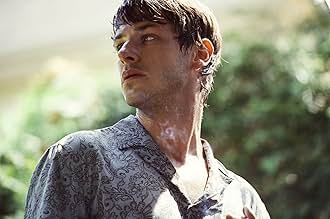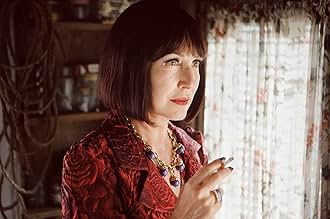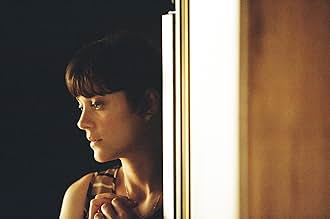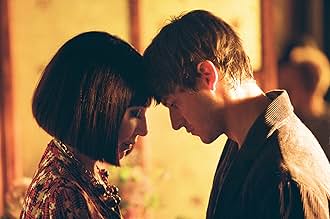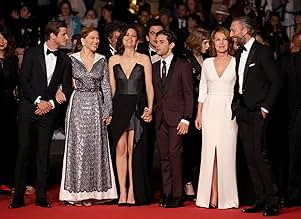AVALIAÇÃO DA IMDb
6,8/10
26 mil
SUA AVALIAÇÃO
Louis, um escritor com doença terminal, volta para casa após uma longa ausência para contar à família que está morrendo.Louis, um escritor com doença terminal, volta para casa após uma longa ausência para contar à família que está morrendo.Louis, um escritor com doença terminal, volta para casa após uma longa ausência para contar à família que está morrendo.
- Prêmios
- 19 vitórias e 39 indicações no total
Antoine DesRochers
- Pierre Jolicoeur
- (as Antoine Desrochers)
- Direção
- Roteiristas
- Elenco e equipe completos
- Produção, bilheteria e muito mais no IMDbPro
Enredo
Você sabia?
- CuriosidadesFirst film directed by Xavier Dolan with only French actors in the cast. His previous films were all starred by Canadian actors. This film, however, was shot entirely in Canada.
- Citações
Antoine Knipper: We think silent people are good listeners. But I shut up so people leave me alone.
- ConexõesFeatured in Xavier Dolan: à l'impossible je suis tenu (2016)
- Trilhas sonorasHome Is Where It Hurts
Written by Camille, Dominique Dalcan, Matthew Ker
Performed by Camille
Published by Blonde Music and Balulalo
Authorized by Warner Music Canada for Parlophone Music France
Avaliação em destaque
I read Jean-Luc Lagarce's play "Juste la fin du monde" a while back and it didn't really make an impression on me. So I was quite intrigued and just a tiny bit worried when I learned that Xavier Dolan, possibly my favorite contemporary film director, was adapting this to me impenetrable text into a movie.
I had confidence in Dolan's genius and was rewarded beyond expectations. The film is as magnificent as anything Dolan has created before. He has said in interviews that at first reading Lagarce's language- also off-putting for me- didn't impress him but that he discovered its power on second random reading. I'm grateful he did and that he has now shared this discovery with his audience with the aid of some truly superb acting performances.
The very first scene establishes everything with narration by protagonist Louis (Gaspard Ulliel), a successful author who is flying to see his family for the first time in over a decade. Louis is dying. Dolan hides Ulliel's face with shadowy lightning and a cap as well as utilizes close-ups so extreme you can't get a proper feel of a face. The close focus continues in the following scenes of Louis's family, only to very gradually move away as the film progresses.
Greeting Louis are his extravagant mother Martine (Nathalie Baye), his coolly detached younger sister Suzanne (Léa Seydoux), his dominant yet socially awkward older brother Antoine (Vincent Cassel) as well as Antoine's shy, even more socially awkward wife Catherine (Marion Cotillard).
Dolan tends to depict extreme personal conflict in his work, uniting his fiercely dramatic, richly colored and always unique visuals with raw scripts that seem to channel Ingmar Bergman's best work. This also occurs in "Juste la fin du monde".
If you looked at the movie without sound you could mistake it for a regular- if exceptionally well shot and acted- drama about a family uniting with the result of old wounds and conflicts emerging and taking over the scenes. This is indeed what basically happens here, but the dialog, to me so difficult to digest from the pages of a book, makes it all about what is left unsaid. Because even as extreme emotion takes over the characters and bursts out they still can't communicate with each other. Lines that one would expect to convey full, sincere, angry honesty are expressed through awkward, even incomprehensible dialog that only hints at the apparently troubled history of these people.
Louis, as mellow and conciliatory as he acts, seems to be a dangerous catalyst for his family, an antigen they all defend their nest against. This is endlessly fascinating and sold so well by the actors, each and every one of them marvelous. The title becomes darkly ironic, as Louis soon seems to find his impending death a minor problem in his severely dysfunctional family. He connects with Catherine, another outsider and someone who he hasn't met before this one day during which the whole film occurs. "How much time?" Catherine asks Louis, a question that together with the offhand mention of Louis's first boyfriend having passed away from "cancer" establishes the fatal backdrop of the AIDS epidemic.
At first glance "Juste la fin du monde" might seem like a melodramatic shouting match that emerges unfocused and aimless, but I ultimately find it urgently compelling and even insightful through its sustained aversion to a genuine unmasking of characters.
Lagarce wrote the original play in 1990, reportedly to examine his own mortality. He was dying himself at that time and finally succumbed to AIDS in 1994. There is a touching dimension to the script's nightmarish reunion as we sense Louis's need to come full circle, to rediscover his childhood and adolescence, even to assure himself that his already estranged family can survive after he's gone. Death is ever present, and instead of trivializing the personal conflicts it elevates them, because they are if nothing else moments of vitality for people not truly living.
I had confidence in Dolan's genius and was rewarded beyond expectations. The film is as magnificent as anything Dolan has created before. He has said in interviews that at first reading Lagarce's language- also off-putting for me- didn't impress him but that he discovered its power on second random reading. I'm grateful he did and that he has now shared this discovery with his audience with the aid of some truly superb acting performances.
The very first scene establishes everything with narration by protagonist Louis (Gaspard Ulliel), a successful author who is flying to see his family for the first time in over a decade. Louis is dying. Dolan hides Ulliel's face with shadowy lightning and a cap as well as utilizes close-ups so extreme you can't get a proper feel of a face. The close focus continues in the following scenes of Louis's family, only to very gradually move away as the film progresses.
Greeting Louis are his extravagant mother Martine (Nathalie Baye), his coolly detached younger sister Suzanne (Léa Seydoux), his dominant yet socially awkward older brother Antoine (Vincent Cassel) as well as Antoine's shy, even more socially awkward wife Catherine (Marion Cotillard).
Dolan tends to depict extreme personal conflict in his work, uniting his fiercely dramatic, richly colored and always unique visuals with raw scripts that seem to channel Ingmar Bergman's best work. This also occurs in "Juste la fin du monde".
If you looked at the movie without sound you could mistake it for a regular- if exceptionally well shot and acted- drama about a family uniting with the result of old wounds and conflicts emerging and taking over the scenes. This is indeed what basically happens here, but the dialog, to me so difficult to digest from the pages of a book, makes it all about what is left unsaid. Because even as extreme emotion takes over the characters and bursts out they still can't communicate with each other. Lines that one would expect to convey full, sincere, angry honesty are expressed through awkward, even incomprehensible dialog that only hints at the apparently troubled history of these people.
Louis, as mellow and conciliatory as he acts, seems to be a dangerous catalyst for his family, an antigen they all defend their nest against. This is endlessly fascinating and sold so well by the actors, each and every one of them marvelous. The title becomes darkly ironic, as Louis soon seems to find his impending death a minor problem in his severely dysfunctional family. He connects with Catherine, another outsider and someone who he hasn't met before this one day during which the whole film occurs. "How much time?" Catherine asks Louis, a question that together with the offhand mention of Louis's first boyfriend having passed away from "cancer" establishes the fatal backdrop of the AIDS epidemic.
At first glance "Juste la fin du monde" might seem like a melodramatic shouting match that emerges unfocused and aimless, but I ultimately find it urgently compelling and even insightful through its sustained aversion to a genuine unmasking of characters.
Lagarce wrote the original play in 1990, reportedly to examine his own mortality. He was dying himself at that time and finally succumbed to AIDS in 1994. There is a touching dimension to the script's nightmarish reunion as we sense Louis's need to come full circle, to rediscover his childhood and adolescence, even to assure himself that his already estranged family can survive after he's gone. Death is ever present, and instead of trivializing the personal conflicts it elevates them, because they are if nothing else moments of vitality for people not truly living.
- trekhyon5
- 4 de jun. de 2017
- Link permanente
Principais escolhas
Faça login para avaliar e ver a lista de recomendações personalizadas
- How long is It's Only the End of the World?Fornecido pela Alexa
Detalhes
- Data de lançamento
- Países de origem
- Centrais de atendimento oficiais
- Idiomas
- Também conhecido como
- It's Only the End of the World
- Locações de filme
- Sainte-Dorothée, Laval, Québec, Canadá(house interiors)
- Empresas de produção
- Consulte mais créditos da empresa na IMDbPro
Bilheteria
- Orçamento
- € 6.900.000 (estimativa)
- Faturamento bruto mundial
- US$ 9.231.823
- Tempo de duração1 hora 37 minutos
- Cor
- Mixagem de som
- Proporção
- 1.85 : 1
Contribua para esta página
Sugerir uma alteração ou adicionar conteúdo ausente


![Assistir a Bande-annonce [OV]](https://m.media-amazon.com/images/M/MV5BOWE2Nzg5NjctOWNhNi00MTEwLWIzOTMtOWQ2MWY1YjM5Y2JjXkEyXkFqcGdeQXRyYW5zY29kZS13b3JrZmxvdw@@._V1_QL75_UX500_CR0)
![Bande-annonce [OV]](https://m.media-amazon.com/images/M/MV5BOTExZGFjM2MtMTFhZC00Y2E3LWJiZGEtNzU4ODlhOGRhZDc0XkEyXkFqcGdeQXRyYW5zY29kZS13b3JrZmxvdw@@._V1_QL75_UX500_CR0)


